PASCO Online Trainings make it easy for districts to provide valuable, high-quality support to teachers who are new to using PASCO solutions. Each subject-specific training is hosted by a PASCO Training Specialist and covers the essentials of collecting, displaying, and analyzing data using PASCO sensors and software that are central to that science discipline. Sharpen your teacher’s software skills with an interactive SPARKvue or PASCO Capstone training, or help them implement PASCO solutions effectively with a subject-specific training session.
Software Trainings
SPARKvue Get Started
Learn how to engage students in hands-on studies of scientific concepts using PASCO Wireless Sensors and SPARKvue software.
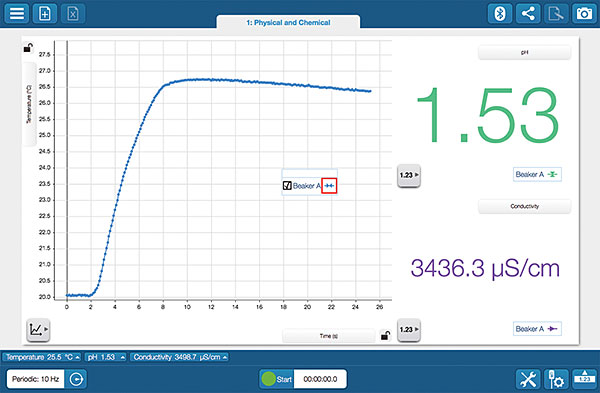
Looking to build essential software skills? We can help.
Let us know how we can support your goals by submitting a quick form »
Featured Sensors
Intended for science departments who are new to using SPARKvue software and PASCO Wireless Sensors, the 90-minute SPARKvue Get Started training session introduces teachers to the essentials of sensor data collection, visualization, and analysis using a series of hands-on activities that span the science disciplines.
Participants begin by performing a tabletop investigation using the Wireless Temperature Sensor to understand how to quickly connect sensors and collect data. Then, they develop core data management and analysis skills as they interpret their graphed measurements to build a model of molecular motion.
Next, teachers observe how to quickly demonstrate the biological activity of a plant leaf using the award-winning Wireless CO2 Sensor, while still engaging students in independent data analysis and interpretation.
Finally, participants apply their new skills to a design challenge. They take control of data sampling options and create their own custom SPARKlab page, striving to design the most effective collision bumper for a Wireless Smart Cart.
Along the way, educators will also discover resources for accessing free, student-ready labs, learn how to save and share sensor data in SPARKvue, and gain familiarity with online resources designed to help continue to develop their sensor and software skills. (PD-1083)
PASCO Capstone™ Get Started
Prepare educators for lasting success across all levels of physical science with a guided introduction to PASCO Capstone™ and PASCO Wireless Sensors.
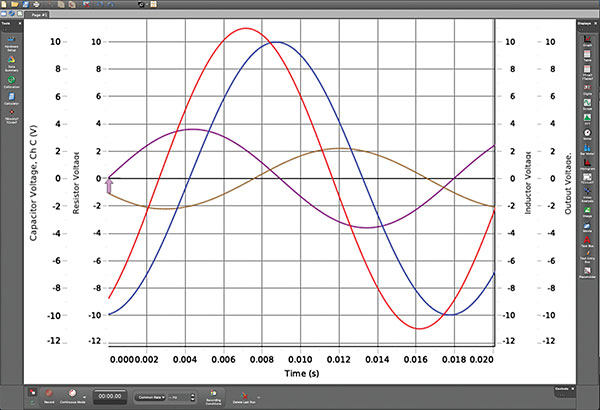
Ready to harness the power of PASCO Capstone™?
Let us know how we can support your goals by submitting a quick form »
Featured Sensors
The 90-minute PASCO Capstone™ Get Started training session introduces physics teachers to the fundamentals of collecting, displaying, and analyzing sensor measurements using PASCO Capstone™ software and PASCO Wireless Sensors.
The session begins with a hands-on exploration of harmonic motion that covers the basics of connecting sensors and collecting measurements from a Smart Cart on an inclined track.
Then, participants learn how to configure data sampling rates and extract information from graphs as they collect and interpret data from the collision of a Smart Cart with a barrier.
Finally, educators explore the relationship between volume and gas pressure using a Wireless Pressure Sensor while delving into more advanced features, such as manual sampling techniques, curve fits, and data transformations.
Throughout the session, participants will also receive access to hundreds of free, student-ready labs, learn how to save and share data in PASCO Capstone™, and gain familiarity with online resources designed to continue the development of their sensor and software skills. (PD-1082)
Curriculum and Equipment Trainings
Essential Physics with Equipment
Learn how to easily and effectively integrate hands-on lab investigations using PASCO Wireless Sensors, SPARKvue software, and Essential Physics 3rd Edition curriculum.

Looking to maximize your Essential Physics e-Book and equipment?
Let us know how we can support your goals by submitting a quick form »
Featured Sensor
Designed for those who are new to PASCO’s Essential Physics curriculum, this 90-minute training session helps educators learn how to effectively integrate investigations using the starter equipment kit and supporting resources from the Essential Physics 3rd Edition e-Book.
After an overview of the Essential Physics program’s components, participants experience the integration of hands-on student investigations into the curriculum by exploring the graphs of motion of a Smart Cart, becoming familiar with the fundamentals of data collection with SPARKvue software.
Next, teachers learn about the content, navigation, accessibility, and assessment features of the student e-Book by surveying the chapter introducing acceleration. Then, they compare the corresponding chapter in the teacher e-Book to discover its lesson structure and additional resources for instructors.
Finally, participants use the resources from the teacher e-Book to perform a hands-on investigation of the relationship between the force on the Smart Cart and its acceleration. (PD-1071)
Essential Chemistry with Equipment
Learn how to easily and effectively integrate hands-on experiments using PASCO Wireless Sensors, SPARKvue software, and Essential Chemistry curriculum.
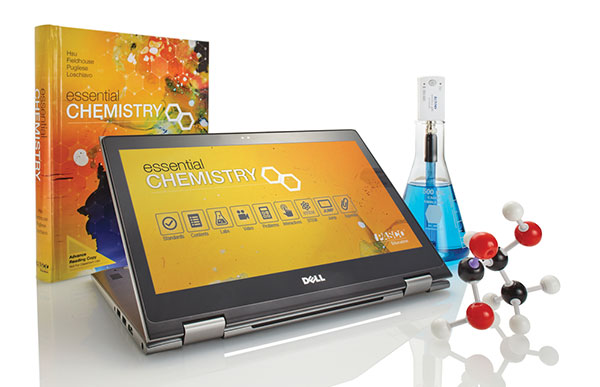
Looking to maximize your Essential Chemistry e-Book and equipment?
Let us know how we can support your goals by submitting a quick form »
Featured Sensor
Designed for those who are new to PASCO’s Essential Chemistry curriculum, this 90-minute training session helps educators effectively integrate supporting resources from the Essential Chemistry e-Book into classroom lessons (including sensor-based laboratory investigations!)
A chapter tour showcases the navigation structure and digital enhancements available to both students and teachers for formative and summative assessment. After the e-Book tour, educators perform a hands-on investigation to gain familiarity with PASCO sensors and SPARKvue software. They use the Wireless Temperature Sensor and Molecular Model Set to master essential experiment skills such as:
- Connecting sensors to class devices and collecting data
- Plotting and displaying sensor data
- Using data analysis tools
Throughout the session, participants will also discover resources for accessing free student-ready labs, learn how to save and share data in SPARKvue, get answers to frequently asked questions about sensor care, and gain familiarity with online resources designed to help continue their learning. (PD-1072)
Science and STEM Trainings
Physics with SPARKvue
This training helps educators develop essential skills for collecting, displaying, and manipulating physics measurements in SPARKvue.
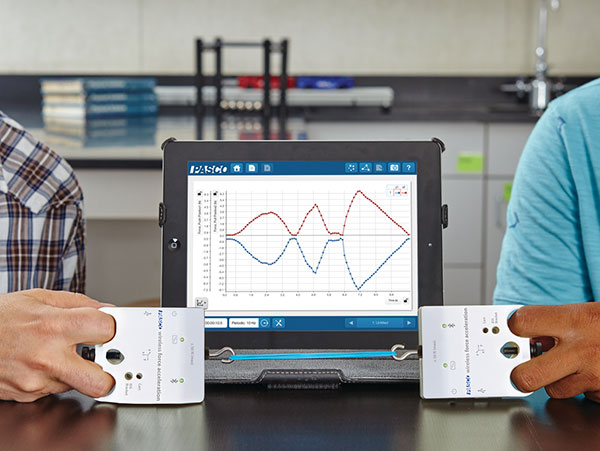
Ready to take physics learning to the next level?
Let us know how we can support your goals by submitting a quick form »
Featured Sensor
Designed for physics teachers who are new to using SPARKvue and PASCO Wireless Sensors, this 90-minute session covers the essentials of data collection, visualization, and analysis using a variety of measurements from the Wireless Smart Cart.
To begin, educators get familiar with connecting a wireless sensor to SPARKvue and configuring the software to graph the Smart Cart's motion up and down an incline. They learn how to use graph analysis tools and save SPARKvue data and files.
Next, participants discover how to build their own SPARKvue display pages and take control of sensor configuration. Lab partners collaborate to use the force measurements from two Smart Carts to investigate Newton's Third Law.
Finally, teachers learn where to find student-ready labs and instructor support resources to perform a hands-on investigation of Newton's Second Law. They collect and manage multiple runs of data and use statistical analysis and curve fit tools to discover the relationship between the force applied to a Smart Cart and its acceleration. (PD-1075)
Chemistry with SPARKvue
Learn how to facilitate hands-on investigations of core chemistry concepts using PASCO Wireless Sensors and SPARKvue software.
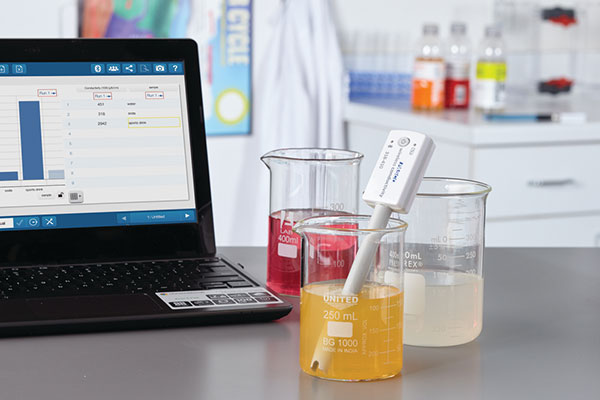
Looking to transform textbook topics into engaging hands-on labs?
Let us know how we can support your goals by submitting a quick form »
Featured Sensors
Designed for chemistry teachers who are new to using SPARKvue and PASCO Wireless Sensors, this 90-minute session covers the essentials of sensor data collection, visualization, and analysis using a variety of chemistry activities.
To get started, educators perform a tabletop investigation of molecular motion to gain familiarity with the data-collection process. They use the Wireless Temperature Sensor to develop key data collection and analysis skills, while learning how to:
- Pair PASCO Wireless Sensors to class devices
- Select and manage sensor measurements
- Graph and analyze sensor data
- Save and share collected measurements
Next, participants learn how to engage students in a demonstration of stoichiometric ratios using the Wireless Pressure Sensor and SPARKvue software. They practice applying skills from the first activity and explore resources for implementing the lab into their own courses.
Finally, educators combine what they have learned by using the Wireless pH Sensor to perform a hands-on investigation of common chemical substances. Participants learn how to create their own SPARKlab page – complete with data displays – and learn how to adjust sampling options for common chemistry labs.
Along the way, educators will also discover resources for accessing hundreds of free, student-ready labs and gain familiarity with online resources designed to help continue their learning. (PD-1073)
Biology with SPARKvue
Learn how to bring biology topics to life using a combination of hands-on activities, PASCO Wireless Sensors, and SPARKvue software.
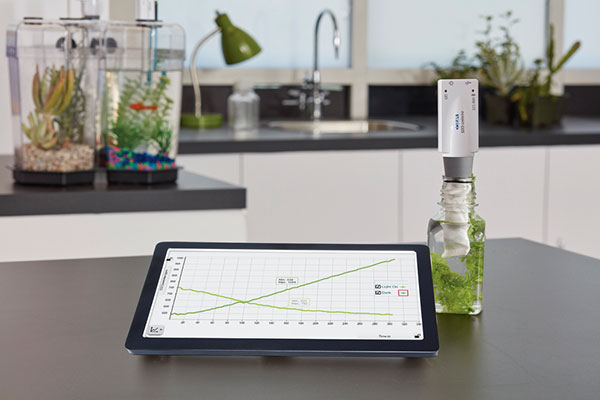
Ready to bolster engagement in your biology courses?
Let us know how we can support your goals by submitting a quick form »
Featured Sensors
Designed for biology teachers who are new to using SPARKvue and PASCO Wireless Sensors, this 90-minute session covers the essentials of sensor data collection, visualization, and analysis using a variety of hands-on activities.
To get started, educators perform a tabletop investigation of homeostasis to gain familiarity with the data-collection process. They use the Wireless Temperature Sensor Link and Fast Response Temperature Probe to develop key data-collection skills, including how to:
- Pair PASCO Wireless Sensors to class devices
- Select and manage sensor measurements
- Graph and analyze sensor data
- Save and share collected measurements
Next, participants learn how to engage students in class demonstrations using real-time sensor data. They pair the Wireless CO2 Sensor with SPARKvue software to quantify biological activity in a plant leaf, while also applying skills from the first activity.
Finally, educators combine what they have learned by creating their own SPARKlab page, complete with data displays and custom sampling options. They use the Wireless pH Sensor to measure solutions, display their measurements, and analyze their findings.
Throughout the session, educators will also discover resources for accessing free student-ready labs, learn how to save and share data collected in SPARKvue, and gain familiarity with resources designed to help continue their learning. (PD-1074)
Agricultural and Environmental Science with SPARKvue
Learn how to support hands-on studies of key concepts in agricultural and environmental science using PASCO Wireless Sensors and SPARKvue software.
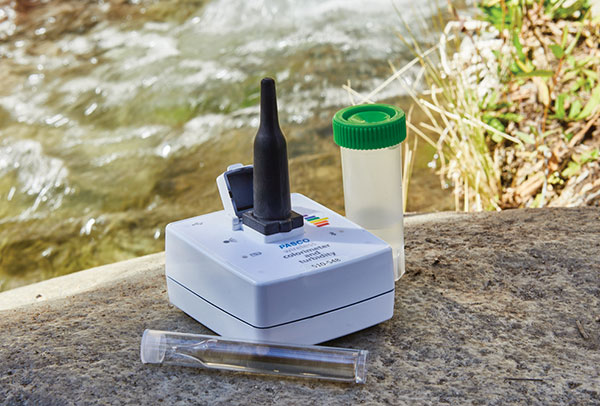
Looking to incorporate more hands-on learning experiences?
Let us know how we can support your goals by submitting a quick form »
Featured Sensors
Designed for those who are new to using SPARKvue and PASCO Wireless Sensors, this 90-minute session covers the essentials of sensor data collection, visualization, and analysis using a variety of activities that are relevant to both courses.
To get started, educators perform a tabletop investigation with the Wireless Temperature Sensor and SPARKvue software to develop a better understanding of the data collection process. They use the Wireless Temperature Sensor to develop key data collection and analysis skills, while learning how to:
- Pair PASCO Wireless Sensors to class devices
- Select and manage sensor measurements
- Graph and analyze sensor data
- Save and share collected measurements
Next, participants learn how to engage students in a class demonstration of pollutants using the Wireless Conductivity Sensor and SPARKvue software.
Finally, educators combine what they have learned by using the Wireless pH Sensor to perform a hands-on investigation of common chemical substances. Participants learn how to create their own SPARKlab page, develop a better understanding of sampling options, and learn how these options affect sensor data collection. This hands-on activity is followed by a demonstration, in which the instructor performs soil quality analysis using the Wireless pH Sensor.
Along the way, educators will also discover resources for accessing hundreds of free, student-ready labs and gain familiarity with online resources designed to help continue their learning. (PD-1076)
Middle School Science with SPARKvue
Learn how to effectively engage your middle school students in science learning using PASCO Wireless Sensors and SPARKvue software.

Ready to infuse more hands-on learning experiences?
Let us know how we can support your goals by submitting a quick form »
Featured Sensors
Intended for science departments who are new to using PASCO Wireless Sensors and SPARKvue software, this 90-minute training session covers the essentials of collecting, displaying, and analyzing sensor data in middle school science classes. Educators will work alongside our expert facilitators to explore a series of hands-on activities and gain familiarity with some of our most popular sensors for middle school science.
To begin, participants perform a tabletop investigation with the Wireless Temperature Sensor to learn how to connect PASCO sensors to class devices and collect sensor measurements. After collecting data, they work to develop core data management and analysis skills, interpreting their graphs to spark discussions about chemical reactions and energy transfer.
Next, educators engage in a hands-on exploration of common substances using the Wireless pH Sensor and SPARKvue software. They learn how to create their own SPARKlab page, develop an understanding of sensor sampling options, and learn how these settings affect sensor data collection. Then they explore methods for engaging students in class demonstrations by observing a facilitator-led demonstration of soil quality analysis with the Wireless pH Sensor.
Finally, participants apply what they have learned by performing a physical science activity. Using the Wireless Motion Sensor, participants will investigate the concepts of position, velocity, and acceleration.
Throughout the session, educators will also discover resources for accessing free student-ready labs, learn how to save and share data collected in SPARKvue, and gain familiarity with resources designed to help continue their learning.
Looking to build skills in a specific middle school science discipline? Check out our other training offerings: Middle School Life Science, Middle School Physical Science, and Middle School Earth Science. (PD-1077)
Middle School Physical Science with SPARKvue
Learn how to effectively engage your middle school students in physical science activities using PASCO Wireless Sensors and SPARKvue software.
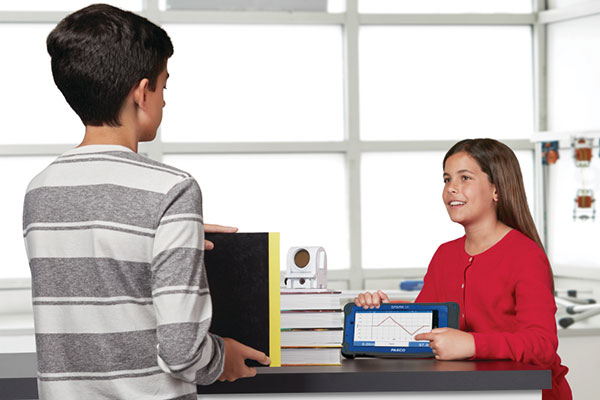
Looking to engage middle school learners in physical science?
Let us know how we can support your goals by submitting a quick form »
Featured Sensors
Intended for middle school physical science teachers who are new to using PASCO Wireless Sensors and SPARKvue software, this 90-minute training session covers the essentials of data collection, visualization, and analysis using a series of hands-on activities for physical science. Educators will work alongside our expert facilitators to explore three core activities and gain familiarity with some of our most popular sensors for physical science.
To begin, participants perform a tabletop investigation with the Wireless Temperature Sensor to learn how to connect PASCO sensors to class devices and collect sensor measurements. After collecting data, they work to develop core data management and analysis skills, interpreting their graphs to spark discussions about chemical reactions and energy transfer.
Next, participants discover how to use data visualization to investigate positive and negative forces using the Wireless Force/Acceleration Sensor, followed by a facilitator-led demonstration of how forces affect motion.
Finally, participants apply what they have learned by performing an investigation of the concepts of position, velocity, and acceleration using the Wireless Motion Sensor.
Throughout the session, educators will also discover resources for accessing free student-ready labs, learn how to save and share data collected in SPARKvue, and gain familiarity with resources designed to help continue their learning. (PD-1078)
Middle School Life Science with SPARKvue
Learn how to effectively engage middle school students in hands-on studies of life science using PASCO Wireless Sensors and SPARKvue software.
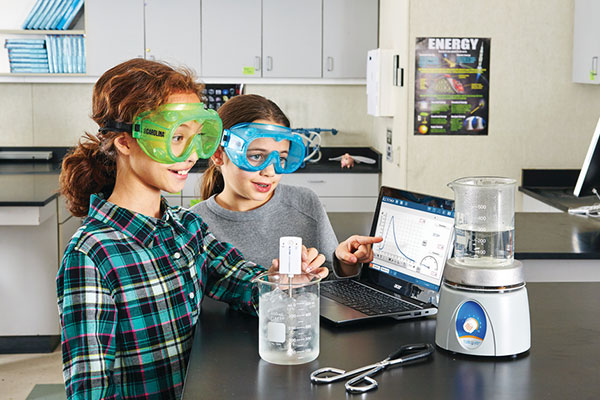
Ready to hone your hands-on science skills?
Let us know how we can support your goals by submitting a quick form »
Featured Sensors
Intended for middle school life science teachers who are new to using PASCO Wireless Sensors and SPARKvue software, this 90-minute training session covers the essentials of data collection, visualization, and analysis using a series of hands-on activities for life science. Educators will work alongside our expert facilitators to explore three core activities and gain familiarity with some of our most popular sensors for life science.
Participants begin by performing a tabletop investigation with the Wireless Temperature Sensor to develop a better understanding of the data-collection process. They learn how to apply essential software features, including how to:
- Connect PASCO Wireless Sensors to class devices
- Collect and display sensor data
- Analyze sensor measurements
- Save and share data collected in SPARKvue
Next, educators engage in a hands-on exploration of photosynthesis using the Wireless CO2 Sensor and SPARKvue software.
Finally, participants apply what they have learned by performing an investigation of common chemical substances. They use the Wireless pH Sensor to measure the pH of each solution, and then analyze their data to develop a better understanding of acids and bases.
Throughout the session, educators will also discover resources for accessing free student-ready labs, learn how to save and share data collected in SPARKvue, and gain familiarity with resources designed to help continue their learning. (PD-1079)
Middle School Earth Science with SPARKvue
Learn how to engage your middle school students in hands-on explorations of earth science using PASCO Wireless Sensors and SPARKvue software.

Looking to support more hands-on explorations of earth science?
Let us know how we can support your goals by submitting a quick form »
Featured Sensors
Intended for middle school earth science teachers who are new to using PASCO Wireless Sensors and SPARKvue software, this 90-minute training session covers the essentials of data collection, visualization, and analysis using a series of hands-on activities for earth science. Educators will work alongside our expert facilitators to explore three core activities and gain familiarity with some of our most popular sensors for earth science.
Participants begin by performing a tabletop investigation with the Wireless Temperature Sensor to develop a better understanding of the data-collection process. They learn how to apply essential software features, including how to:
- Connect PASCO Wireless Sensors to class devices
- Collect and display sensor data
- Analyze sensor measurements
- Save and share data collected in SPARKvue
Next, participants will explore data collection possibilities, including remote logging capabilities using the Wireless Weather Sensor with GPS.
Finally, educators combine what they have learned by using the Wireless pH Sensor to perform a hands-on investigation of common chemical substances. Participants learn how to create their own SPARKlab page, develop a better understanding of sampling options, and learn how these options affect sensor data collection. This hands-on activity is followed by a demonstration in which the instructor performs a simulation of acid rain activity using the Wireless pH Sensor.
Throughout the session, educators will also discover resources for accessing free student-ready labs, learn how to save and share data collected in SPARKvue, and gain familiarity with resources designed to help continue their learning. (PD-1080)
Interested in a PASCO Online Training?
Let us know how we can support your goals by submitting the form below. A member of our Professional Development team will reach out to discuss potential training solutions.

